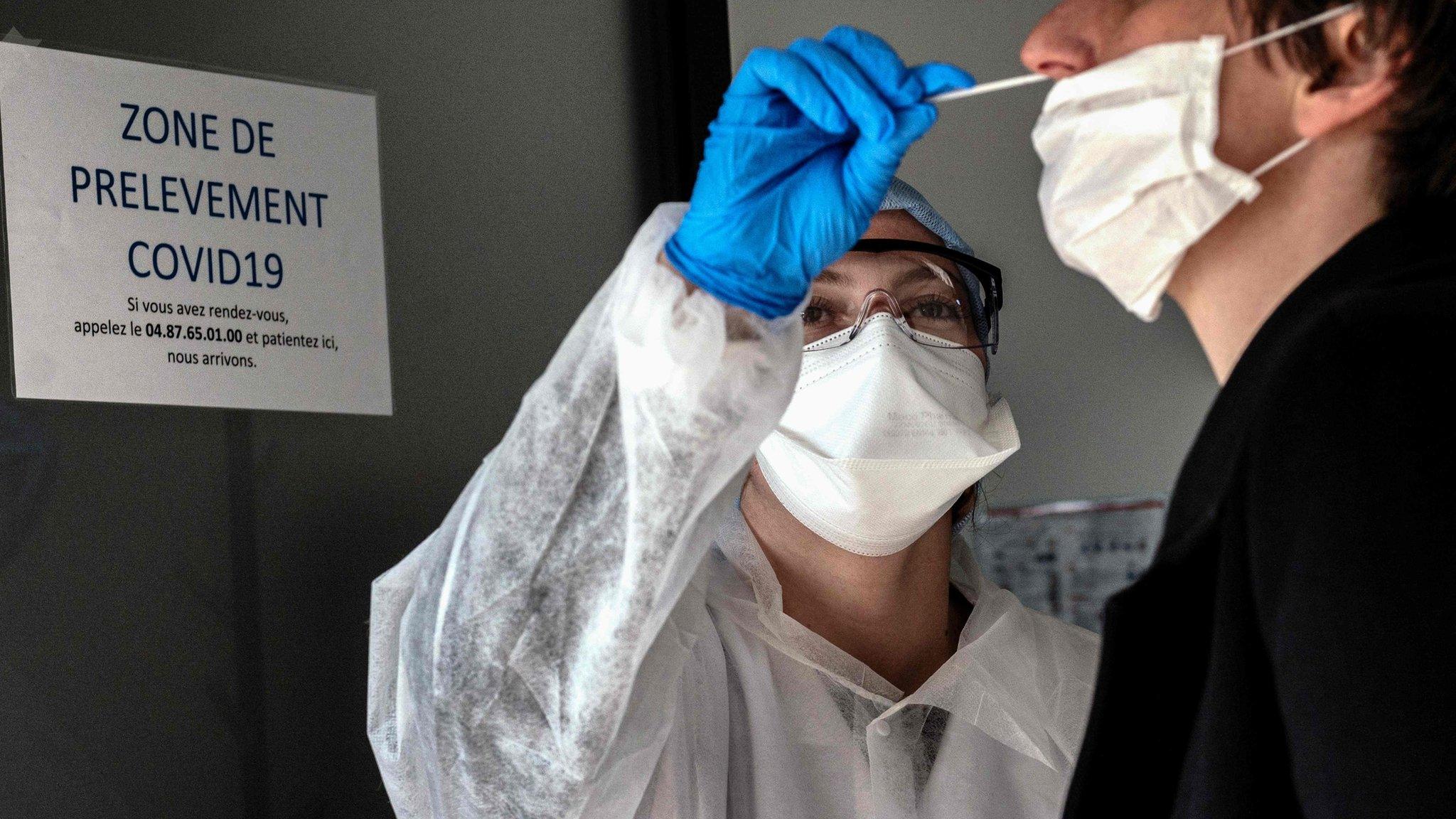Coronavirus: Pandemic is 'accelerating', WHO warns as cases pass 300,000
- Published
- comments

The WHO chief urged the G20 group of nations to boost production of protective equipment
The World Health Organization (WHO) has warned that the coronavirus disease pandemic is "accelerating", with more than 300,000 cases now confirmed.
It took 67 days from the first reported of Covid-19 to reach 100,000 cases, 11 days for the second 100,000, and just four days for the third 100,000.
But WHO Director General Tedros Adhanom Ghebreyesus said it was still possible to "change the trajectory".
He urged countries to adopt rigorous testing and contact-tracing strategies.
"What matters most is what we do. You can't win a football game by defending. You have to attack as well," he told a joint news conference with Fifa president Gianni Infantino to launch a "kick out coronavirus" campaign featuring footballers.
Allow X content?
This article contains content provided by X. We ask for your permission before anything is loaded, as they may be using cookies and other technologies. You may want to read X’s cookie policy, external and privacy policy, external before accepting. To view this content choose ‘accept and continue’.

Dr Tedros said asking people to stay at home and other physical-distancing measures were an important way of slowing down the spread of the virus, but described them as "defensive measures that will not help us to win".
"To win, we need to attack the virus with aggressive and targeted tactics - testing every suspected case, isolating and caring for every confirmed case, and chasing and quarantining every close contact."

A SIMPLE GUIDE: What are the symptoms?
AVOIDING CONTACT: Should I self-isolate?
MAPS AND CHARTS: Visual guide to the outbreak
VIDEO: The 20-second hand wash

Dr Tedros expressed alarm at reports from around the world of large numbers of infections among health workers, which appeared to be the result of a shortage of adequate personal protective equipment.
"Health workers can only do their jobs effectively when they can do their jobs safely," he warned. "Even if we do everything else right, if we don't prioritise protecting health workers many people will die because the health worker who could have saved their life is sick."
Reality Check tackles misleading health advice being shared online
He said the WHO has been working with its partners to rationalise and prioritise the use of protective equipment, and to address the global shortage of it.
But he noted: "Measures put in place to slow the spread of the virus may have unintended consequences of exacerbating shortages of essential protective gear and the materials needed to make them."
The WHO chief called for "political commitment and political co-ordination at the global level" and said he would ask leaders of the G20 group of nations this week to work together to boost production of protective equipment, avoid export bans and ensure equity of distribution on the basis of need.


Europe's battle against virus intensifies
UK Prime Minister Boris Johnson announced on Monday night that, with immediate effect, "people will only be allowed to leave their home...for very limited purposes". They include shopping for basic necessities, taking one form of exercise per day, fulfilling any medical need, or travelling to work if working from home is impossible.
The number of people who have died in the UK rose to 335 on Monday.
In Italy, the worst-hit country in the world, the authorities said 602 people with Covid-19 had died in the past 24 hours, bringing the total death toll there to 6,077.
But the daily increase was the smallest since Thursday, raising hope that the stringent restrictions imposed by the government were starting to have an effect.
Spain, however, said its death toll had risen by 462 to 2,182 - a 27% increase.
Israel's coronavirus patient number 74 posts about her experience on social media
France reported 186 new deaths, bringing its total to 860. The government will tighten the lockdown there from Tuesday, strictly limiting physical exercise and closing most open-air markets.
Meanwhile, International Olympic Committee member Dick Pound said the 2020 Tokyo Olympics would be postponed by one year because of coronavirus. However, the IOC has not yet formally announced a decision on the future of the Games.
The IOC has given itself four weeks to decide on the future of the games, but Australia and Canada have said they will not compete in Japan this summer and Great Britain has said it is unlikely that it would be able to send a team.
In other developments:
In the United States, where 481 people have died, state governors and city mayors pleaded for help from the federal government
President Donald Trump ordered the deployment of National Guard troops in the three hardest-hit states - California, New York and Washington
The Indian government said it would stop all domestic flights from the early hours of Wednesday as it ramped up its measures to contain the virus
South Africa's government said a 21-day lockdown would be imposed from Thursday
Brazil's President, Jair Bolsonaro, bowed to fierce criticism in Congress and withdrew measures that would have allowed companies to put employees on unpaid work for up to four months
The United Nations called for a "global ceasefire" to allow the world to tackle the pandemic. Secretary-General António Guterres warned that the most vulnerable people - "women and children, people with disabilities, the marginalized and the displaced" - would pay the highest price if conflicts continued